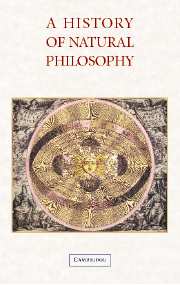Book contents
- Frontmatter
- Contents
- Preface
- 1 Ancient Egypt to Plato
- 2 Aristotle (384–322 BC)
- 3 Late Antiquity
- 4 Islam and the Eastward Shift of Aristotelian Natural Philosophy
- 5 Natural Philosophy before the Latin Translations
- 6 Translations in the Twelfth and Thirteenth Centuries
- 7 Natural Philosophy after the Translations: Its Role and Place in the Late Middle Ages
- 8 The Form and Content of Late Medieval Natural Philosophy
- 9 The Relations between Natural Philosophy and Theology
- 10 The Transformation of Medieval Natural Philosophy from the Early Modern Period to the End of the Nineteenth Century
- Conclusion
- Bibliography
- Index
7 - Natural Philosophy after the Translations: Its Role and Place in the Late Middle Ages
Published online by Cambridge University Press: 05 June 2012
- Frontmatter
- Contents
- Preface
- 1 Ancient Egypt to Plato
- 2 Aristotle (384–322 BC)
- 3 Late Antiquity
- 4 Islam and the Eastward Shift of Aristotelian Natural Philosophy
- 5 Natural Philosophy before the Latin Translations
- 6 Translations in the Twelfth and Thirteenth Centuries
- 7 Natural Philosophy after the Translations: Its Role and Place in the Late Middle Ages
- 8 The Form and Content of Late Medieval Natural Philosophy
- 9 The Relations between Natural Philosophy and Theology
- 10 The Transformation of Medieval Natural Philosophy from the Early Modern Period to the End of the Nineteenth Century
- Conclusion
- Bibliography
- Index
Summary
By the beginning of the thirteenth century, the major treatises of Greek and Arabic origin in science and natural philosophy were available in Latin translation. It is almost certain that lectures were being given on at least some of Aristotle's books on natural philosophy at the new universities of Oxford and Paris in the first decade of the thirteenth century. This is evident from the fact that in 1210, the Parisian Synod decreed, among other things, that “no lectures are to be held in Paris either publicly or privately using Aristotle's books on natural philosophy or the commentaries, and we forbid all this under pain of excommunication.” The prohibition of 1210 is a good indication that Aristotle's works on natural philosophy were readily available, for otherwise there would have been no need to ban public and private lectures on them. Although the University of Paris is not specifically mentioned in the decree, it is virtually certain that mention of public lectures is a reference to lectures at the university. To place medieval natural philosophy in its proper context, it is essential to describe the structure and character of the universities, which were indeed the “proper context” for Aristotle's natural philosophy and the commentaries on, and elaborations of, it. Indeed, it is almost as if the universities of Oxford and Paris, and their numerous successors, came into being to serve this function.
THE MEDIEVAL UNIVERSITY
In the course of the eleventh and twelfth centuries, Europe had rapidly become urbanized.
- Type
- Chapter
- Information
- A History of Natural PhilosophyFrom the Ancient World to the Nineteenth Century, pp. 143 - 178Publisher: Cambridge University PressPrint publication year: 2007



